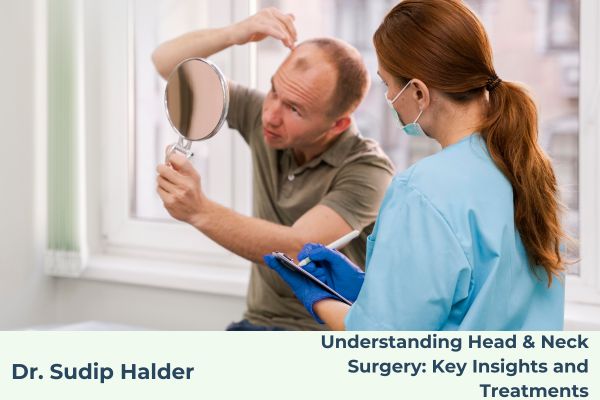Understanding Head & Neck Surgery: Key Insights and Treatments
Understanding Head & Neck Surgery: What You Need to Know with Dr. Sudip Haldar Head & neck surgery is a specialized area of medicine that addresses a wide range of medical conditions affecting the head, neck, throat, and facial regions. These procedures can be life-saving, improving quality of life, and even restoring functionality after trauma or disease. In this blog, Dr. Sudip Haldar, an expert in head and neck surgery, provides a comprehensive guide on what this type of surgery involves, common conditions treated, and what you need to know before undergoing a procedure. What is Head & Neck Surgery? Head & neck surgery refers to surgical procedures aimed at treating disorders in the head, neck, throat, mouth, sinuses, larynx (voice box), thyroid gland, and lymph nodes. This branch of surgery involves specialists in otolaryngology, oncology, and plastic surgery who work together to manage diseases, cancers, infections, and deformities. Common Conditions Treated by Head & Neck Surgery What to Expect Before, During, and After Surgery Before Surgery:Dr. Sudip Haldar emphasizes the importance of pre-surgical evaluations, which may include imaging tests, blood work, and a thorough medical history review. Proper preparation, such as fasting before surgery and managing other health conditions, will help ensure a smooth procedure. During Surgery:The type of surgery performed depends on the condition being treated. Some procedures may be minimally invasive, using endoscopic techniques to reduce recovery time and scarring. More extensive surgeries, such as those involving cancer or facial reconstruction, may require longer recovery periods. In most cases, general anesthesia is used to ensure comfort and safety throughout the surgery. After Surgery:Recovery will vary based on the complexity of the surgery. Dr. Sudip Haldar works closely with patients during the post-operative period to ensure proper healing. This may involve pain management, wound care, and follow-up visits to monitor progress. In some cases, rehabilitation might be necessary to regain full functionality. Minimally Invasive Techniques in Head & Neck Surgery With technological advancements, minimally invasive surgery has become more common in the treatment of head and neck conditions. Endoscopic techniques allow surgeons like Dr. Sudip Haldar to perform precise operations through small incisions, leading to quicker recovery times, reduced scarring, and less pain for patients. Key Takeaways: Head & neck surgery is a powerful tool in treating complex conditions that affect vital areas of the body. If you or a loved one is dealing with a condition that may require surgery, Dr. Sudip Haldar’s expertise can help guide you toward the right treatment for a better, healthier future.
Understanding Head & Neck Surgery: Key Insights and Treatments Read More »

